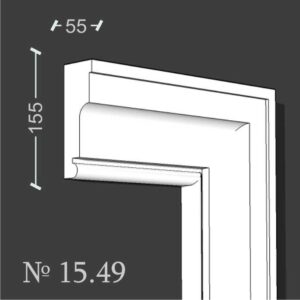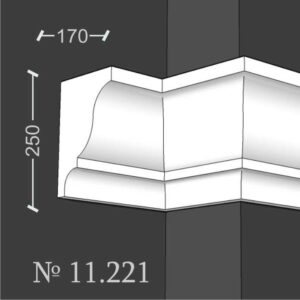Japanese Zen spaces are characterized by their tranquil and minimalistic aesthetic, which often incorporates natural materials to create a serene environment. Wooden wall paneling is a key element in these designs, offering both beauty and simplicity. This type of design not only enhances the visual appeal of a space but also contributes to a sense of calm and mindfulness.
Harmony in Wood: Modern Zen Interiors with Wooden Wall Paneling
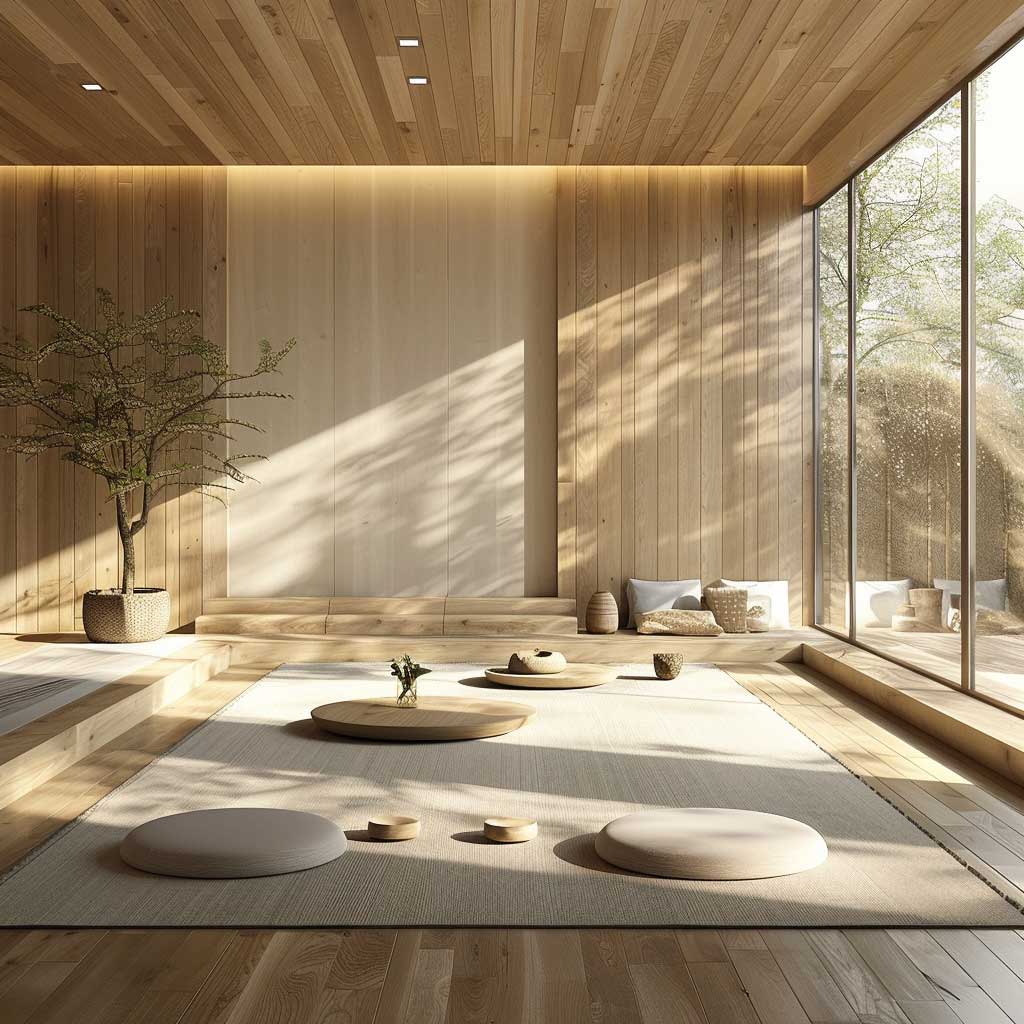



Modern Zen interiors, characterized by their serene and minimalistic approach, often incorporate wooden wall paneling design to enhance the tranquil ambiance of living spaces. The choice of wood as a primary material not only invokes the timeless elegance of nature but also adheres to the principles of Zen philosophy, which emphasizes simplicity, natural beauty, and a connection to the natural world. The wooden paneling in a Zen setting acts as more than just a decorative feature; it serves as the backbone of the design, promoting calm and mindfulness.
In a Zen-inspired living room, wooden wall paneling is typically sleek and understated, allowing the natural texture and grain of the wood to stand out. This type of design complements the minimalist furniture that is common in Zen interiors, such as low sofas in neutral colors, simple coffee tables, and essential functional pieces that do not overwhelm the space. The use of neutral colors helps in creating a visually soothing environment that is ideal for relaxation and introspection.
The strategic use of natural light plays a crucial role in these spaces. Large windows that allow ample sunlight to filter through not only illuminate the beauty of the wooden paneling but also create a play of light and shadows that adds a dynamic quality to the room throughout the day. This interaction between light and wood enhances the organic feel of the space, making it more inviting.
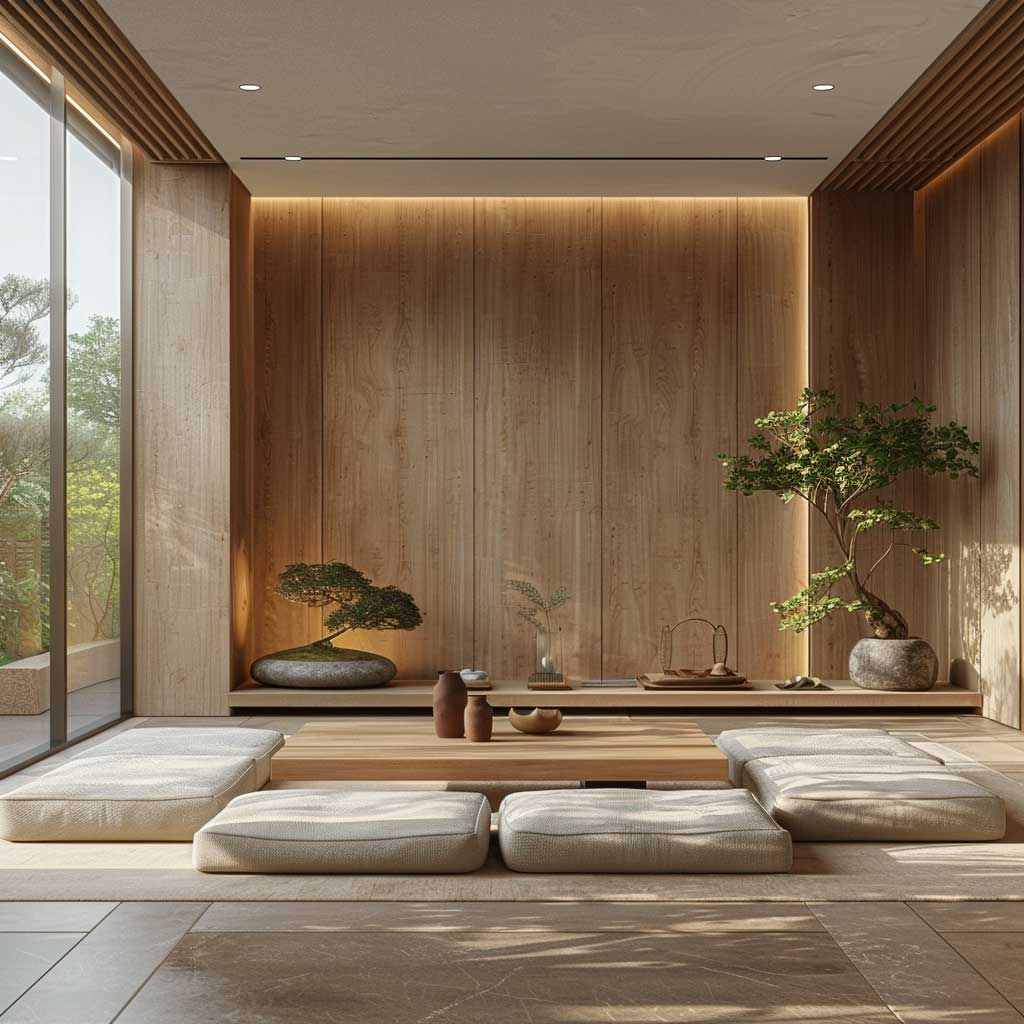

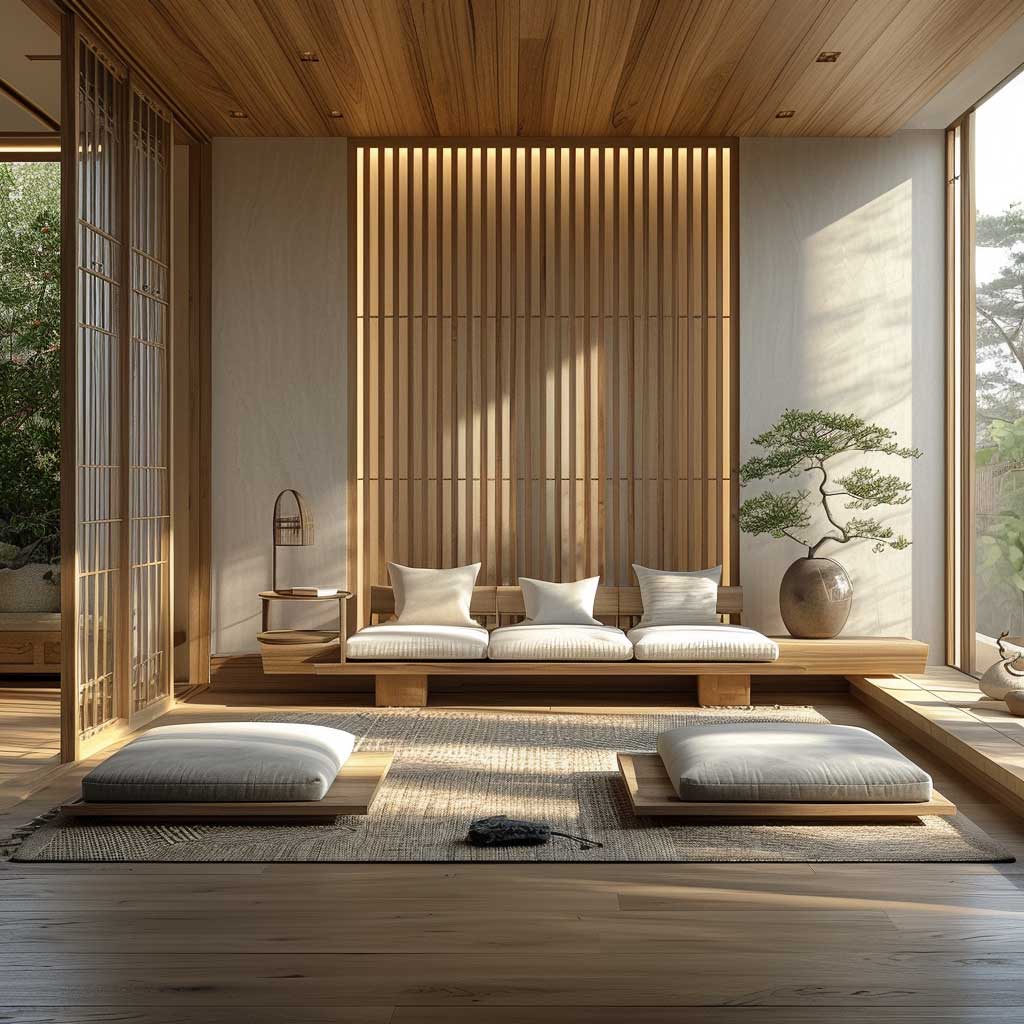

Furthermore, Zen interiors often feature elements that connect the indoor environment with the natural world outside. This might include a small indoor water feature, like a fountain or a bamboo plant, which introduces sound and life into the space, augmenting the wood’s natural qualities. Such elements reinforce the Zen principle of harmony and balance between the built and natural environments.
The design also favors an open space concept, avoiding clutter and ensuring that each item within the room has a purpose and place. The clear, unobstructed spaces allow for free movement and unimpeded thought, which is essential in a Zen-inspired setting. The overall effect of wooden wall paneling in such a design is not only visually appealing but also spiritually uplifting, making it an integral part of creating a Zen-like atmosphere at home.
Tranquil Retreat: Wooden Wall Paneling Design in Zen Homes
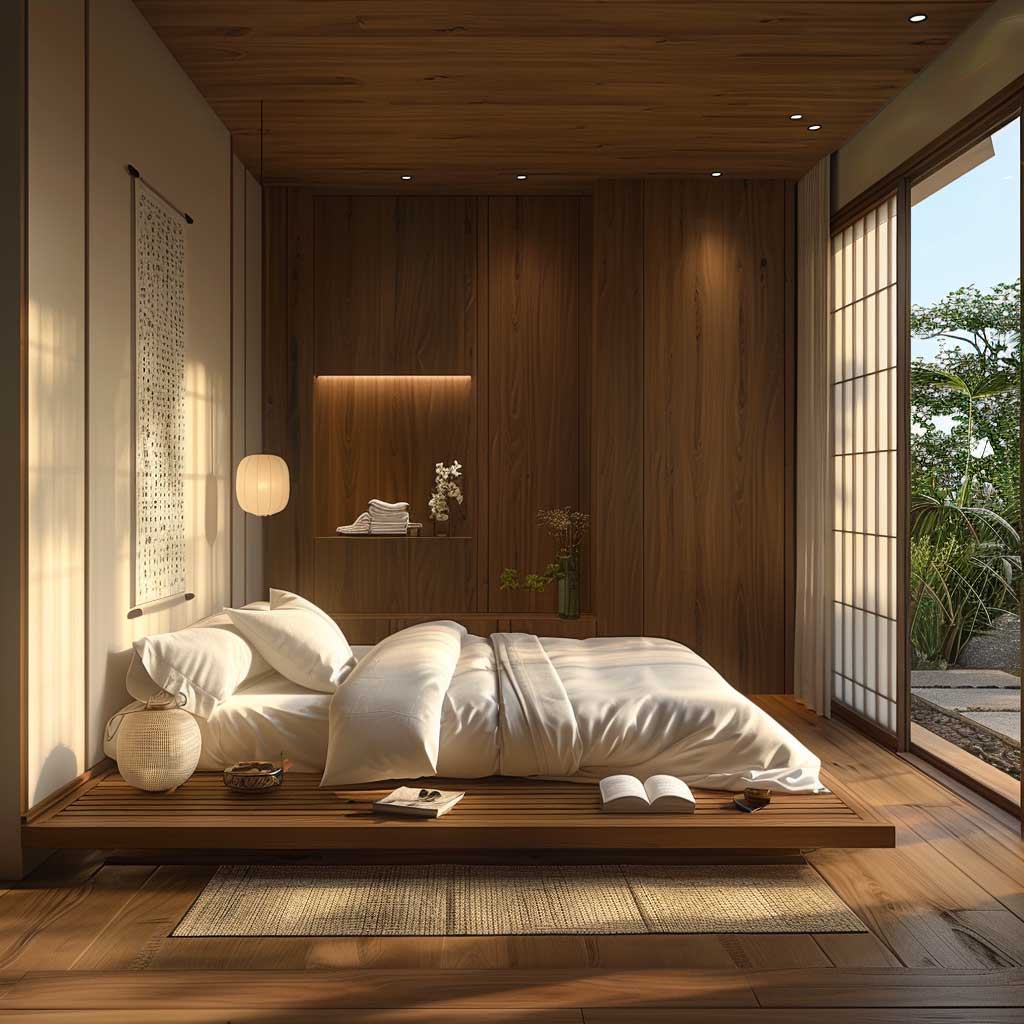
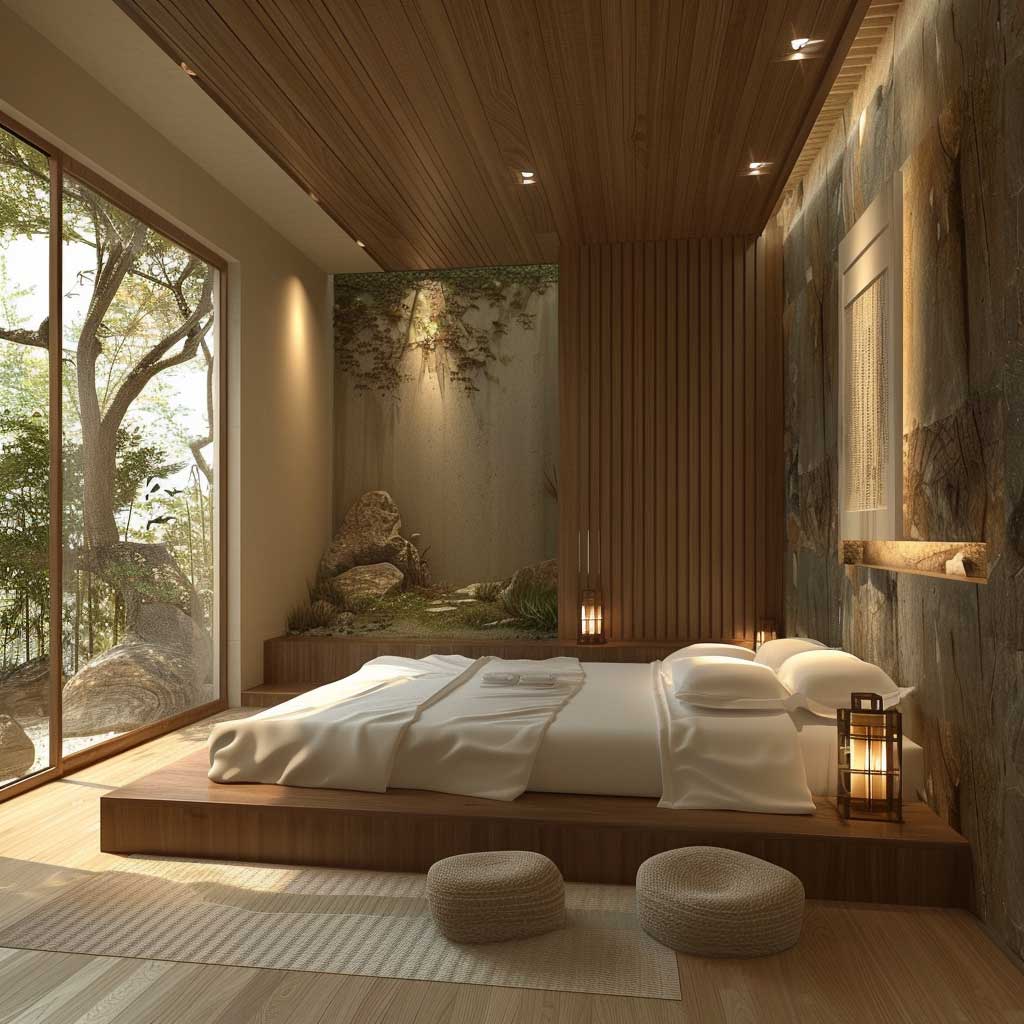


The bedroom in a Zen home is often envisioned as a retreat from the stresses of daily life, a sanctuary where tranquility reigns supreme. Wooden wall paneling is a critical design element in these bedrooms, adding warmth, texture, and a sense of natural beauty that is synonymous with Zen aesthetics. The wooden walls provide a soothing backdrop that is both visually appealing and emotionally comforting, setting a perfect stage for relaxation and contemplation.
In a Zen bedroom, the wooden paneling often features soft, warm hues that invite calmness and help to soothe the mind before sleep. The texture of the wood can vary from smooth and refined to more rustic and textured types, depending on the overall design theme of the home. This versatility in design allows wooden wall paneling to be a universal choice for Zen interiors, adaptable to different tastes and styles.
Furniture in these rooms is carefully selected to maintain the minimalist theme. A low-profile bed with a simple, sturdy frame, typically made of wood to match the paneling, anchors the room. Bedding is typically organic in fabric and muted in color, complementing the naturalistic theme. Other furniture is minimal – perhaps a single dresser or a modest bedside table, ensuring that the focus remains on the simplicity and beauty of the space itself.
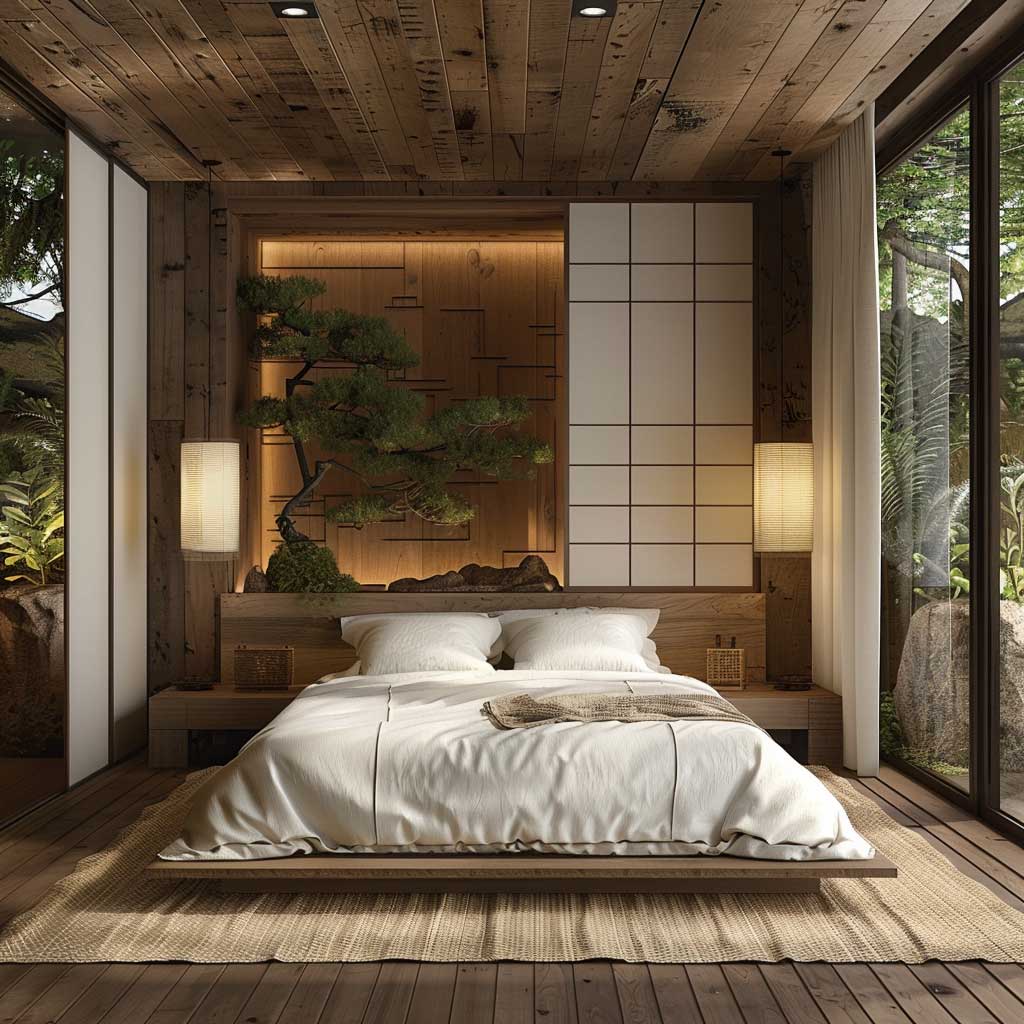


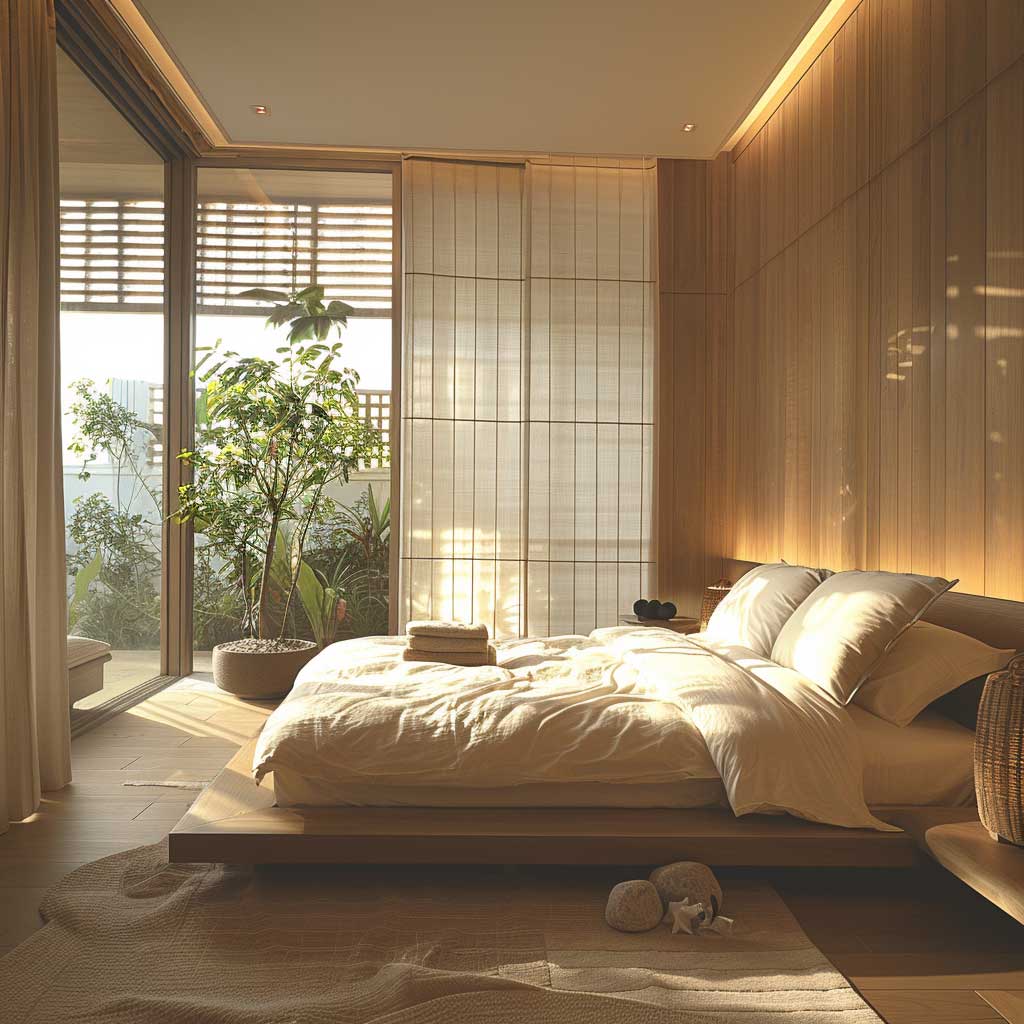
Lighting too is key in a Zen bedroom. Soft, diffused light fixtures help create a warm glow that highlights the wood paneling’s natural grains and textures. This lighting is not just functional but is also used to enhance the room’s calm atmosphere. Often, the light is designed to mimic the natural softness of dawn or dusk, adding to the room’s restful qualities.
Moreover, the integration of nature extends beyond just material choices. Many Zen bedrooms feature large windows or glass doors that look out onto natural landscapes or serene gardens. These views serve as a live canvas, changing with the seasons and time of day, providing a constant reminder of the world’s beauty and impermanence, core tenets of Zen philosophy.
Minimalist Elegance: Sleek Wooden Wall Paneling for Zen Spaces
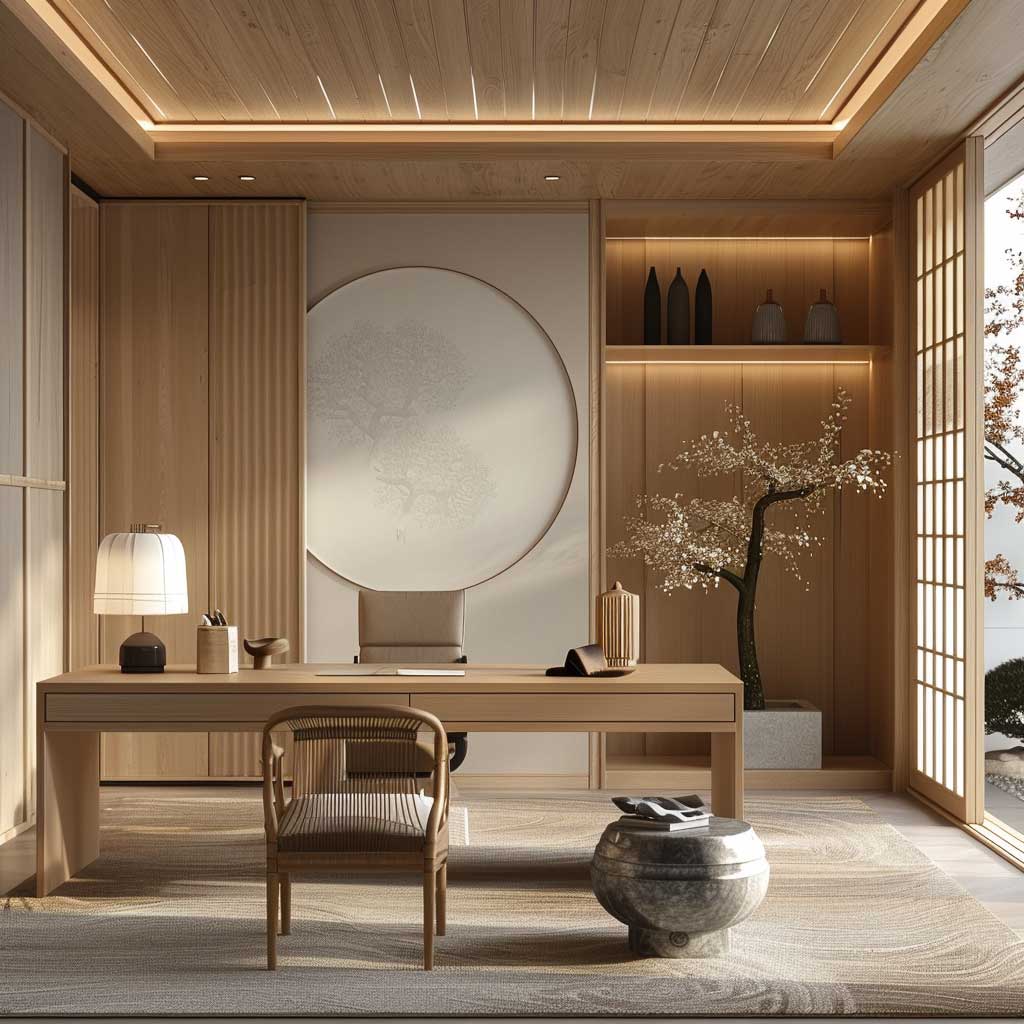
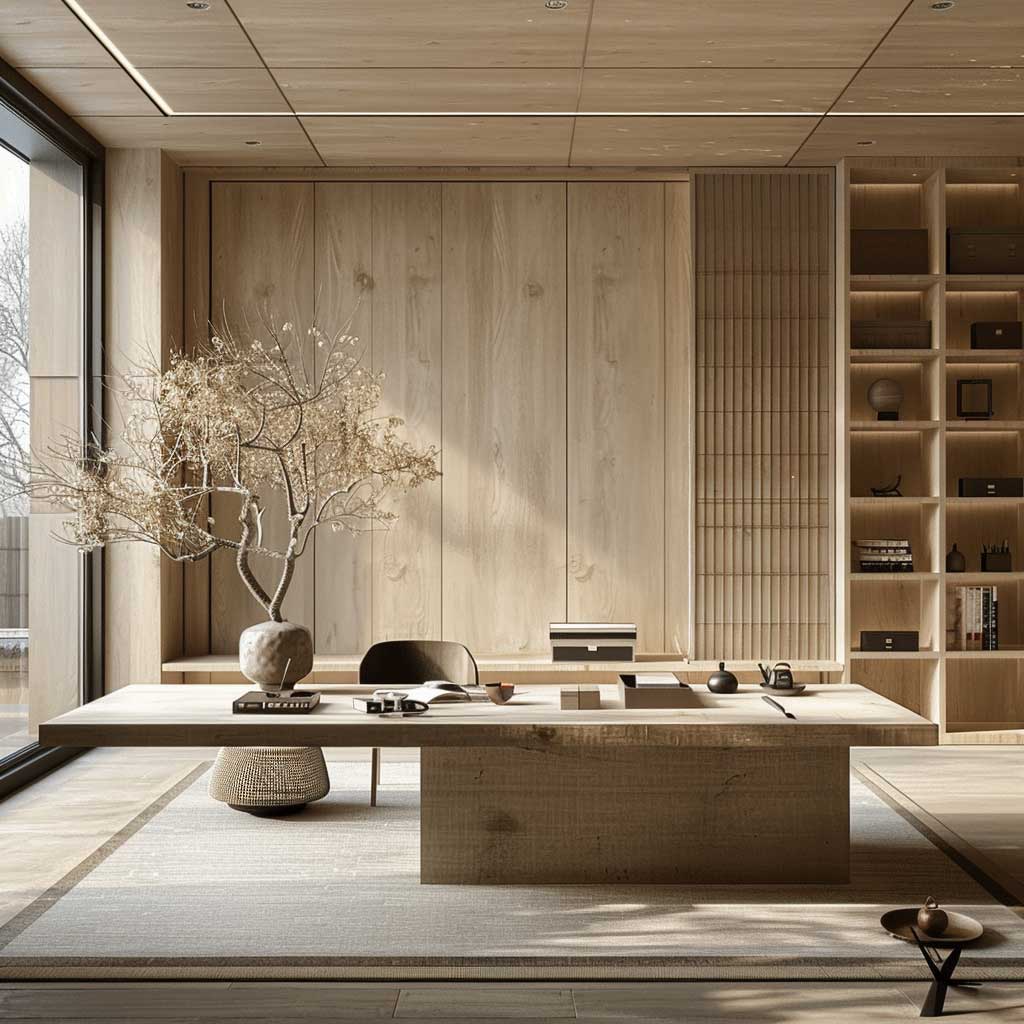

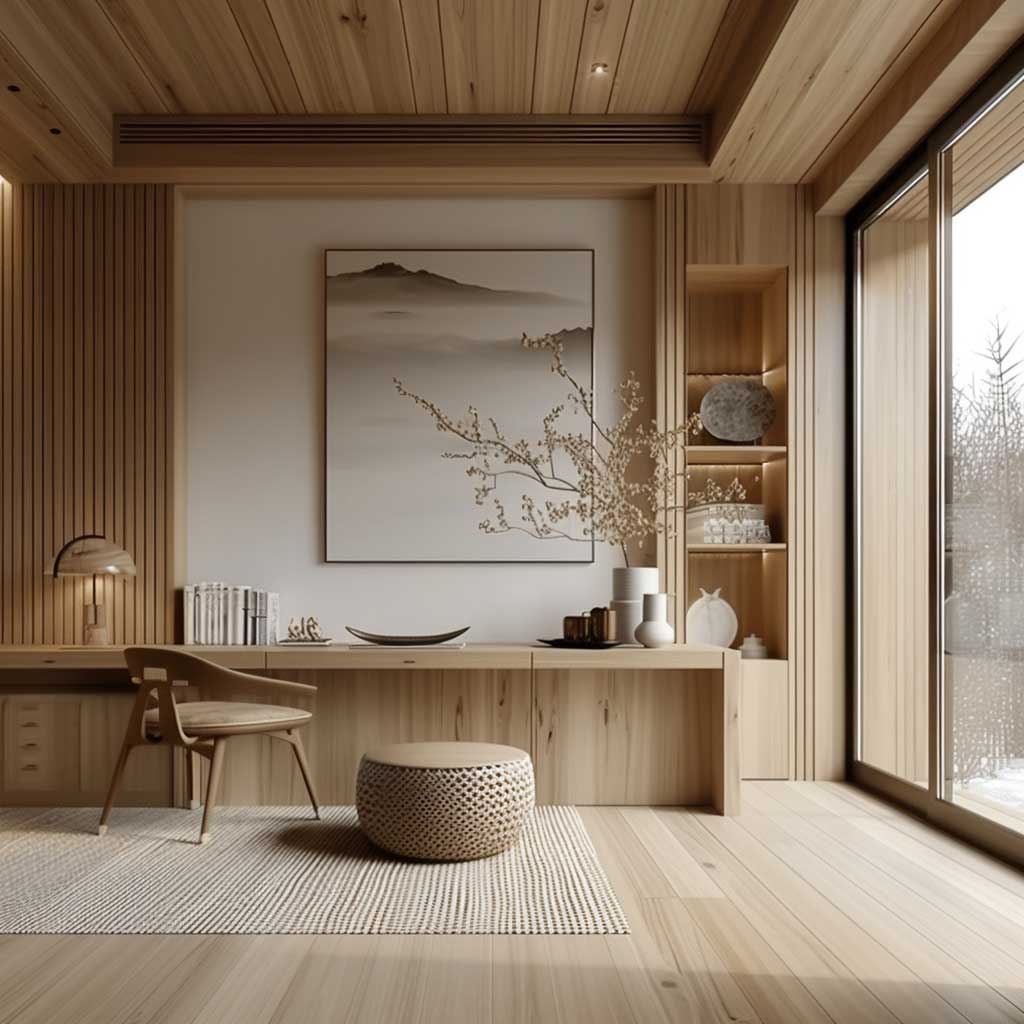
The minimalist design philosophy in Zen spaces emphasizes the importance of each element serving a purpose, avoiding unnecessary clutter. This principle is beautifully exemplified in the use of sleek, light-colored wooden wall paneling in areas such as a Zen study. This choice not only aesthetically aligns with the minimalist ethos but also serves functional purposes, creating a serene backdrop that enhances concentration and mindfulness.
The light color of the wood paneling in a study or office reflects natural light, brightening the room and making it appear more spacious. This visual expansion of space is crucial in minimalist design, where the perception of openness and uncluttered surfaces promotes a clearer mindset. The smooth finish of the wood panels adds to the room’s clean and orderly appearance, reinforcing the Zen commitment to cleanliness and simplicity.
Furniture in such a space is thoughtfully chosen to complement the wooden paneling. A simple yet elegant wooden desk, possibly with hidden compartments for storage, ensures that only necessary items are visible, maintaining a neat and tidy appearance. The chair accompanying the desk is usually ergonomically designed for comfort, yet aesthetically simple, avoiding any ornate details or loud colors that could disturb the peaceful ambiance.




Decor in these rooms is minimal, often consisting of one or two carefully selected pieces that add a personal touch without causing distraction. This might include a piece of abstract art that inspires creativity or a small, sculptural element that adds an organic touch to the room. The focus remains on maintaining an environment conducive to focused work and creative thinking, free from the usual distractions of a typical office setting.
Large windows that offer views of tranquil settings play a crucial role in these minimalist Zen spaces. They not only provide ample natural light but also connect the indoors with the outdoors, a key aspect of Zen philosophy that promotes harmony between man and nature. The view from the windows can serve as a source of inspiration and a reminder of the world outside, helping to maintain a balanced perspective during work hours.
In all, the use of sleek wooden wall paneling in a Zen study exemplifies how design can align with philosophy, creating spaces that are not only functional and beautiful but also spiritually enriching and conducive to personal growth.
Incorporating wooden wall paneling in Zen-inspired spaces can transform ordinary rooms into peaceful sanctuaries. This approach to interior design not only promotes relaxation and tranquility but also brings the innate beauty of nature indoors, aligning with the Zen philosophy of simplicity and naturalness.







